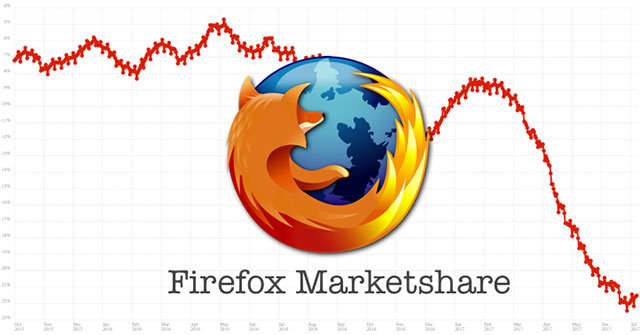Why is Firefox faster, uses less memory and still can't win Chrome?
According to Gal: 'Firefox's market share is falling'. And so is Firefox's situation. The most interesting thing about these data and Gal's interpretation of it is: Firefox is coming to its sunset, but it is also becoming a better browser. It works faster than ever, using less memory than -so rival Chrome. And of course, just as the war between Betamax and VHS shows, getting a better product is probably not gaining more market share.
The question here is why? Why does Firefox, even faster, use less memory, still lose to rival Chrome?
Gal said that most of the reason was due to Google's monopoly on search as well as Chrome's rampant marketing campaigns. When logging in to Google Mail, Google Calendar or YouTube, you will see Chrome inserts, top bar and many other ways to display. What these ads want to convey is that no matter what the web browser is, if it is not Chrome, it will be slow and unsafe.
As Gal says: 'It is hard to compete on a mature market when your main competitor gets free marketing billions of dollars'. Indeed, that is not possible.
'The decline of Firefox is not a technical issue,' Gal wrote. 'It is a market breakdown (moving from desktop to mobile) and monopoly. There is no technical solution to these market problems. '
To be fair, there are several ways to explain Firefox's market share decline with Gal's data. Gal used Mozilla's public data (previously) on the latest desktop installs of Firefox. There are two potential problems with this type of data.
Old Windows XP users will not be counted because they do not use the latest Firefox version. We also have old version users because some features are removed in the new version. For example, it will take another few years for me to switch to using Firefox 57 or above because Mozilla has decided to remove the old add-ons. Because the power of add-ons also plays an important role in Firefox's appeal, I won't upgrade the browser until the plugins are upgraded too.
Although there is a lot of evidence to put Mozilla or Firefox in a weak position, there are many other ways to tell them. Firefox still has 90 million users, though less than before, but not too little.

Firefox's market share is declining though it is still a very good browser
Another important issue to realize is that it's a curse in Silicon Valley and in the capitalist world as a whole: Firefox doesn't need to be the market leader either. Surprise?
Right. Firefox can still survive and live well with the second, even the third browser position in the market. The fact that my favorite browser, Vivaldi, is hard to be identified on the market share map.
Is proprietary culture on the web bad? Yes, it makes the whole system easy to crash, but despite Firefox's market share is declining, the browser market still has no monopoly phenomenon.
When Firefox was released, Microsoft monopolized it by installing IE on every Windows machine. Now Chrome is also somewhat exclusive. But there is an important difference between IE and Chrome - Google does not ignore the web the way Microsoft does with IE, meaning that the role of Firefox today does not need it to have a lot of market share. Firefox can play a different role, providing an alternative for those who need it without having to worry about market share.